Vitamin A is an essential nutrient for all living things. It provides vision, supports the immune system, and helps create protective barriers. However, some people with kidney disease are restricted in their intake of vitamin A to prevent further damage to the kidneys. This blog post will explain what vitamin A does in your body, why you should limit your intake if you have kidney disease, diet sources of vitamin A, and how much of it you can eat on a renal diet.
Table of Contents
What is vitamin A?
Vitamin A is a fat-soluble vitamin. It is also known as retinol, retinal, or retinoic acid.
As a fat-soluble vitamin, vitamin A requires fat in our diet for it to be absorbed from our digestive system and into our bloodstream. The liver stores vitamin A for us.
Although it can be stored in the body, it is still considered an essential micronutrient. This means we cannot make it, so we must get it from our diet.
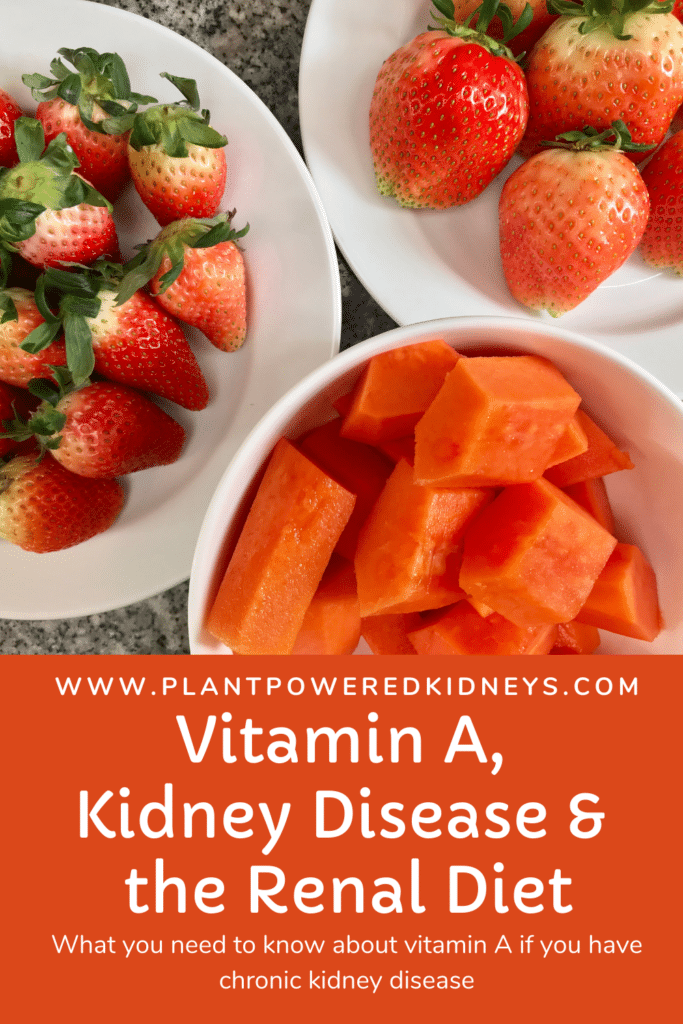
Types of Vitamin A
The active form of vitamin A is also known as retinol. This type is found in animal foods and supplements.
The precursor for vitamin A is beta-carotene, which is converted to vitamin A in the body. This type of vitamin A is found in plants.
Functions of Vitamin A
Vitamin A does a surprising number of things to keep us healthy. Some you may already know about, and some you may not.
Learn more below about the functions of vitamin A and how they connect with our kidney health.
Vision and Eye Health
Did your parents ever tell you to eat carrots when you were little so you could see in the dark?
Vitamin A plays an important in vision as helping us to see from light to dark. This is why vitamin A is generally known as the “eye vitamin.”
Immune Function
Besides vision, vitamin A is also known for its role in immune function. Vitamin A is an antioxidant and can help protect cells against free radicals.
Free radicals are molecules we can get from radiation, smoke, even in normal metabolism, and breakdowns of foods.
These free radical molecules have also been linked to diseases like cancer, which makes vitamin A that much more important.
Bone and Teeth Health
Vitamin A also helps with healthy teeth, nails, and bone health.
This is where we start to see a vitamin A kidney connection because we already know how closely related bone health and kidney health are.
This article about phosphorus covers a bit about that – read more here.
Healthy Skin and Hair
Another function of vitamin A is to give us healthy and strong skin and hair. Healthy skin is very important, as it serves as a protective barrier for us from things that shouldn’t enter the body.
Vitamin A doesn’t just keep our skin healthy, It also keeps other protective barriers in the body healthy as well. Examples include the gut lining, the lining of our respiratory tract, and even our inner ear.
Sources of Vitamin A & Kidney Disease
As mentioned above, there are two types of vitamin A found in the diet. The first is known as preformed (or “active”) vitamin A, otherwise known as retinol.
This can be found in animal foods such as meat, poultry, fish, and dairy products. The preformed vitamin A is also found in supplements and fortified foods.
The second type is provitamin A, also known as beta-carotene. This is technically not vitamin A but is converted to vitamin A retinal and then retinol, in our body.
Plant Foods
Even though animal meats have vitamin A, so do plants! There are plenty of plants and vegan foods that have the provitamin A that the body can use.
Low Potassium Vitamin A Sources: Vegetables and Fruits
Here’s a list of foods that are low in potassium and the amount of vitamin A. These can be great options for most everyone with kidney issues.
| Low Potassium Vegetables | Vitamin A (per 100 grams) |
|---|---|
| Kale, raw | 241 mcg |
| Turnip Greens, cooked | 275 mcg |
| Carrot, raw | 835 mcg |
| Red Bell Pepper, raw | 157 mcg |
| Swiss Chard, raw | 306 mcg |
| Spinach, raw | 469 mcg |
| Romaine Lettuce, raw | 436 mcg |
| Low Potassium Fruits | Vitamin A (per 100 grams) |
|---|---|
| Grapefruit | 46 mcg |
| Watermelon | 28 mcg |
| Papaya | 47 mcg |
| Apricot | 96 mcg |
| Tangerine | 34 mcg |
| Guava | 31 mcg |
High Potassium Vitamin A Sources
As discussed in other articles about potassium, many with kidney disease can and should include high potassium foods.
Below is a list of high potassium fruits and vegetables along with their vitamin A content.
| High Potassium Vegetables | Vitamin A (per 100 grams) |
|---|---|
| Sweet Potato, cooked | 960 mcg |
| Butternut Squash, cooked | 268 mcg |
| Collards, cooked | 361 mcg |
| Turnip Greens, cooked | 275 mcg |
| Swiss Chard, raw | 55 mcg |
| High Potassium Fruits | Vitamin A (per 100 grams) |
|---|---|
| Mango | 45 mcg |
| Cantaloupe | 135 mcg |
| Apricot | 79 mcg |
| Tangerine | 33 mcg |
| Nectarine | 332 mcg |
| Guava | 26 mcg |
| Passion Fruit | 1270 mcg |
Again, our liver does an excellent job of storing vitamin A. The United States does not have a high risk of vitamin A deficiency.
Animal Foods
As discussed above, the active form of vitamin A can be found in animal foods. Below are examples of animal foods that are considered good sources of vitamin A.
| Food | Vitamin A (per 100 grams) |
|---|---|
| Egg Yolks | 1440 mcg |
| Cheddar Cheese | 316 mcg |
| Beef Liver | 31700 mcg |
| Liverwurst | 4220 mcg |
| Butter | 684 mcg |
| Cod Liver Oil | 30000 mcg |
| Chicken Liver | 4300 mcg |
| Salmon | 149 mcg |
| Liver Sausage | 8310 mcg |
| King Mackerel | 252 mcg |
Considering the liver is where our vitamin A is stored, it makes sense that foods from liver would have very high levels of vitamin A!
Fun fact: Eating a polar bear liver would kill a person! I learned that during my undergrad… a “fun” fact I’ll never forget!
How much vitamin A do I need?
In general, the recommended amount of vitamin A is 900 mcg for adult men and 700 mcg for adult women per day.
As you can see from the tables of vitamin A-rich foods, it can be easy to get enough, even on a low potassium renal diet.
Read more about potassium on the renal diet here.
The Tolerable Upper-Level intake is 3,000 mcg per day for adults.
How do I know how much vitamin A I have?
Two types of tests are available to determine how much vitamin A you have. There is a test of the retinol-binding protein (RBP) that is available to hold and transport vitamin A.
There is also a serum blood test that looks at actual vitamin A amounts.
An indicator of low vitamin A levels would be serum vitamin A below 25 ug/dL.
Ask your healthcare provider about your levels of vitamin A if you have any questions or concerns.
Deficiency of Vitamin A: Signs & Symptoms
It’s important to note here that those in the United States and other developed countries get plenty of vitamin A from their diet. A diet low in vitamin A is uncommon here in the United States.
Signs and symptoms of vitamin A deficiency can include;
- Xerophthalmia (dryness and inflammation of the eye)
- Dry skin
- Diarrhea
- Night blindness
- Anemia
- Infections
- Poor wound healing
Vitamin A deficiency is seen in children and women in underdeveloped countries and is the lead cause of preventable blindness in children.
The most common symptom of vitamin A deficiency is night blindness. This can be tested with your eye doctor (optometrist). They can determine how your sight is at night and when transitioning from light to dark areas.
However, a vitamin A deficiency will not occur overnight.
Since vitamin A is stored in the liver, a deficiency will arise only after stores are depleted from a long-standing diet with inadequate vitamin A intake.
Anemia from a vitamin A deficiency is different compared to anemia from chronic kidney disease. Read more about anemia and iron in the renal diet here.
Toxicity of Vitamin A: Signs & Symptoms
Since vitamin A is stored in the liver, there is a risk of getting too much of it. This is where we start to make the vitamin A kidney disease connection.
Too much vitamin A can be caused by a diet that is extremely high in vitamin A or supplements that include megadoses.
Excessive vitamin A can cause;
- Nausea
- Vomiting
- Vertigo
- Blurry vision
- High triglyceride levels
- Mental status changes
- Seizures
- Headache
- Loss of appetite
Highly excessive vitamin A intake (more than 10,000 mcg per day) can cause advanced health complications such as;
- Bone thinning
- Liver damage
- Joint pain
- Birth defects
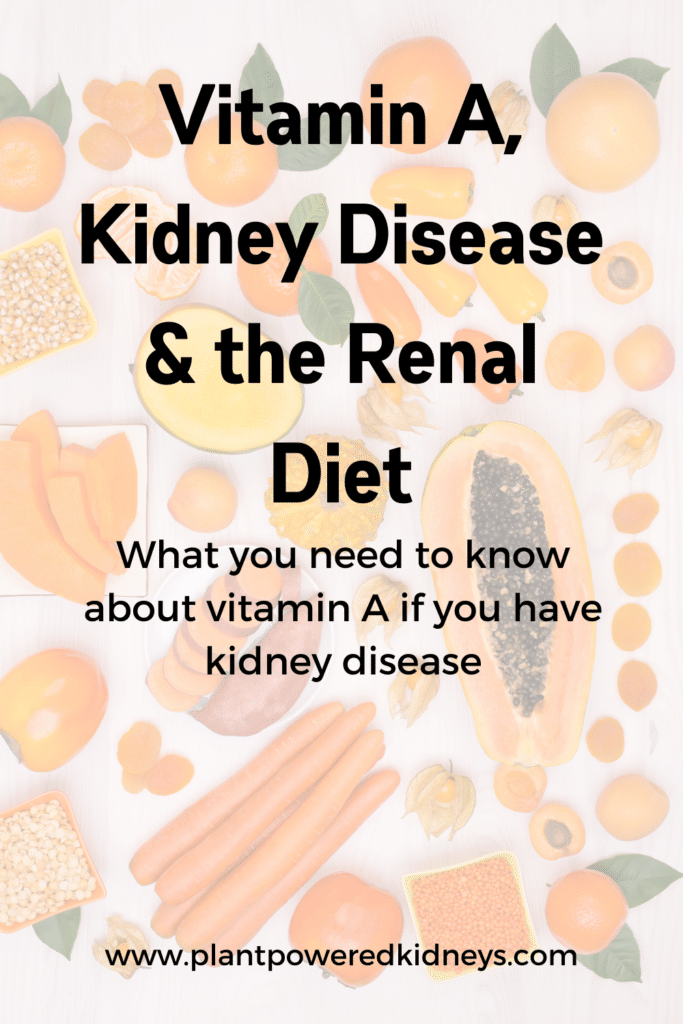
Vitamin A & Kidney Stones
There is a possible association that a diet with higher levels of vitamin A and more calcium oxalate stones.
This may be related to how vitamin A is part of bone formation and breakdown, but the connection has not been studied enough.
One study found that those with calcium stones seemed to have a diet higher in vitamin A, whereas those with uric acid stones did not have the same correlation.
However, another study performed on rats found that after a lithogenic diet, in a group with a vitamin A supplement, kidney filtration had improved. It’s important to note this study was on rats, not humans.
Vitamin A and Kidney Disease
There are some considerations when it comes to a vitamin A kidney connection. Below include some of the research surrounding vitamin A and kidney disease.
High Calcium Levels
While excessive amounts of vitamin A don’t appear to have a direct effect on your kidneys, a study found that end-stage kidney failure patients on hemodialysis had high calcium levels as a result of taking a multivitamin that included vitamin A.
If you have hypercalcemia, otherwise known as high calcium levels in the blood, review your supplements and talk with your doctor about the potential causes.
Excessive vitamin A could be part of it, but there are other more common reasons for high calcium levels, including too much vitamin D.
Vitamin A Retention with End-Stage Kidney Disease
Another study including children with chronic kidney disease not on dialysis found that for every 10% drop in eGFR, there was a 13% increase in vitamin A levels.
It’s important to note that those with higher levels of vitamin A in their system had achieved it from supplements.
Another study looked at the vitamin A levels for people in different stages of kidney disease. They found those with lower GFR had higher levels of retinol circulating in the body.
Vitamin A Supplements with Kidney Disease
As just discussed above, those with kidney disease were found to have higher levels of vitamin A, especially if including supplements or fortified nutrition products.
A vitamin A supplement should only be taken if directed by your doctor or dietitian. The dosing guidelines and timeline should also be provided, and a routine assessment of your vitamin A levels should be scheduled.
In general, a vitamin A supplement is contraindicated if you have chronic kidney disease. So what about renal vitamins?
Do renal vitamins have vitamin A?
Check your multivitamin to see how much vitamin A it contains. Ideally, it should be little to none.
Renal vitamins are specifically designed to support certain vitamins that those with chronic kidney disease may not get enough of in the diet or lose through dialysis.
Here is an article that includes a nice comparison of different types of renal vitamins and the nutrients they contain. None of the renal vitamins include vitamin A.
This is one of the reasons why it can be important to evaluate your vitamin and supplement needs. Those with kidney disease may not be advised to take a standard or over-the-counter multivitamin.
Summary
It is important to remember that vitamin A can be found in both plant and animal foods. The great thing about this micronutrient is that it’s stored in the liver, which means deficiency is rare.
However, if you have kidney disease or are on dialysis treatments, avoid taking supplements with too much Vitamin A because your body will not be able to process them properly.
If you’re looking for a good way of getting more vitamin A into your diet, try adding carrots or pumpkin.
Congratulations on learning so much about vitamin A! We hope you find these tips helpful when incorporating vitamins into your healthy lifestyle.

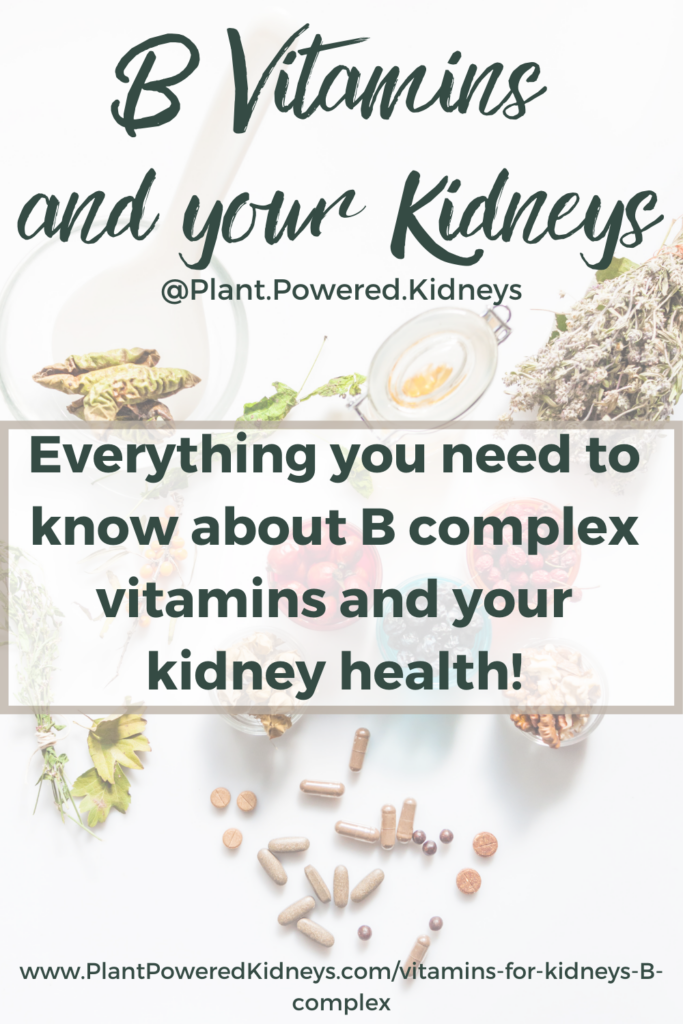
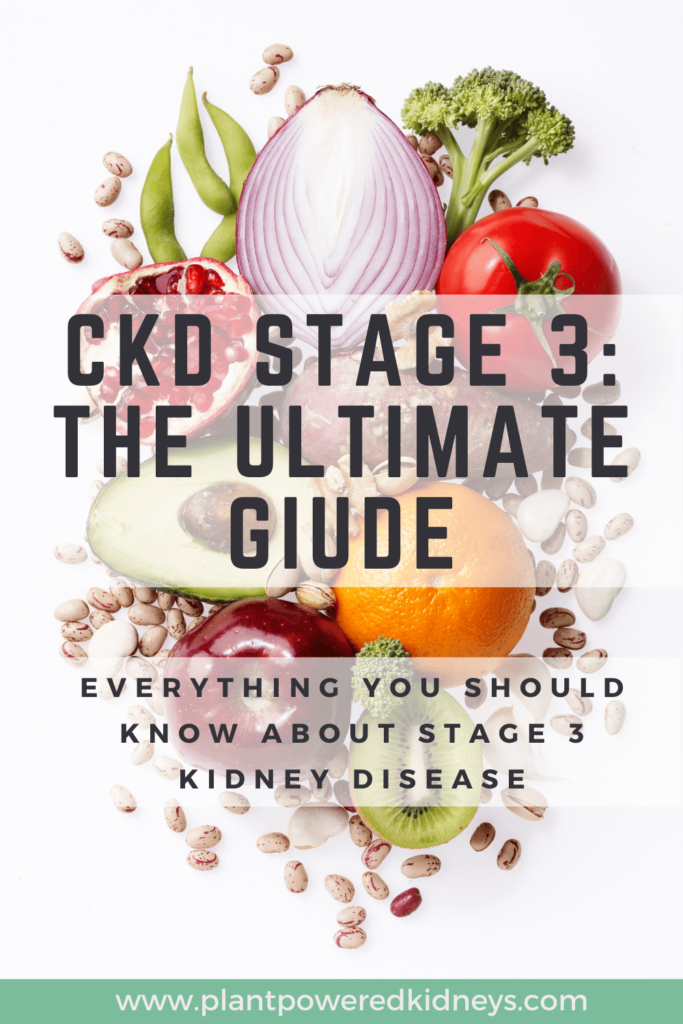
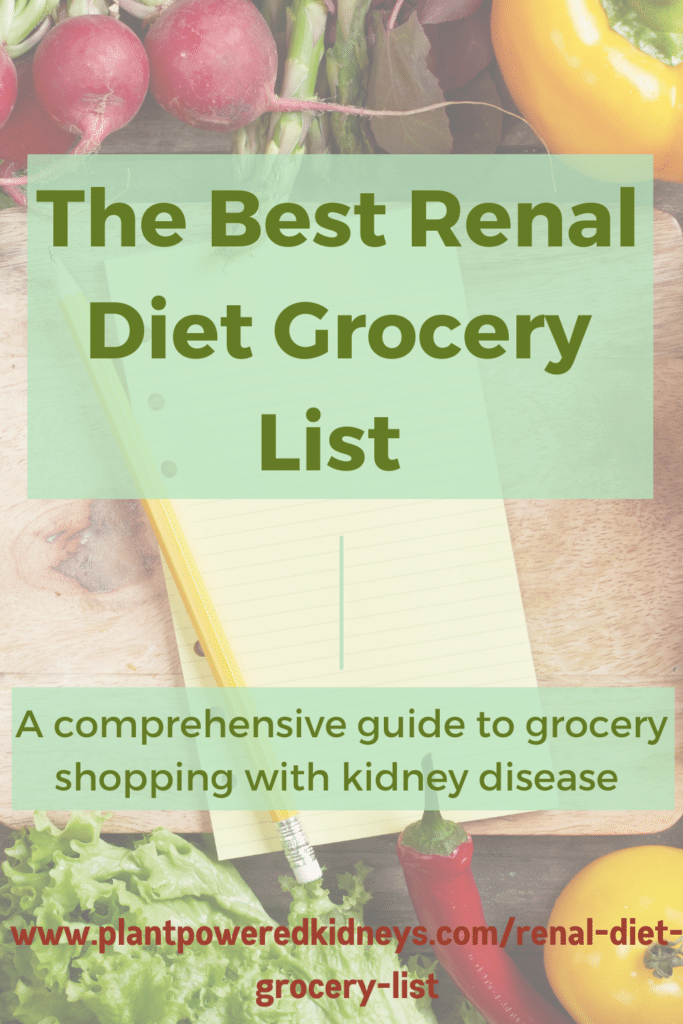
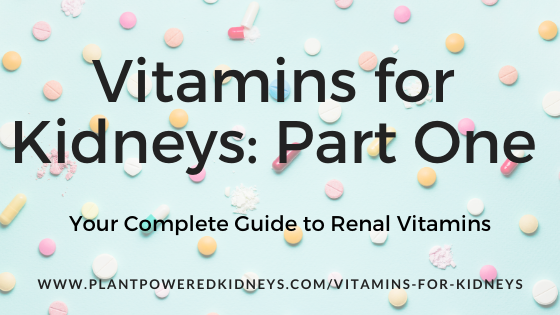
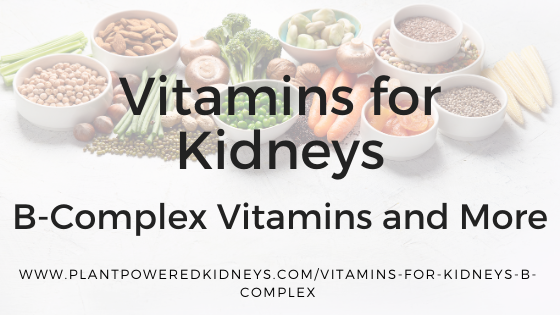
Thank you for info about vitamin A. Didn’t know sweet potato was vitamin A.
You’re welcome! We can see how easy it is to get vitamin A in our foods – no supplements necessary! – Jen
I am always asking about vitamin and mineral levels. I have asked this question and will check as a preventative my level.
It’s great to find more ways to explore our health, isn’t it? 🤩
Thank you this was a very useful post.
You’re most welcome, Alesia! We’re happy to hear it has been useful to you. 😊
I started taking adk 5000 Biote , for about 3 years now , i stopped taking them and now i have some withdrawal symptoms , if i get my vitamins from food , no more withdrawals ? how can avoid those ? thank you and sorry if i am asking too much
This sounds like a question that should be answered by your healthcare team. We wouldn’t be able to respond because we don’t know the backstory (and are not ethically or legally allowed to provide such advice here).